Condition: Squamous Cell Carcinoma (SCC)
Alternative names: SCC, non-melanoma skin cancer.
The incidence of all types of skin cancer has increased dramatically over the last few decades. At the Harley Street Dermatology Clinic, we are experts in diagnosing and treating cancer. Whether it be treated by topical therapy, radiotherapy or plastic surgery, you can rest assured that our consultants will provide you with the best possible care. Please see before and after images below of skin cancer treated surgically.
REQUEST A CALL BACK
Arrange a consultation with one of our expert dermatologists today.
WHAT IS SQUAMOUS CELL CARCINOMA?
Squamous cell carcinoma is the second commonest form of skin cancer accounting for around 10% of skin cancer in the UK. It is a malignant tumour arising from the epidermis at the skin surface. SCC is classified by its level of ‘differentiation’ (i.e. how abnormal the cells and tumour structure appear under the microscope). Tumours can be well, moderately or poorly differentiated.
The rate of growth and chance of spread of SCC depends on the differentiation the tumour exhibits with well-differentiated tumours being less aggressive than poorly-differentiated ones:
- Well differentiated SCC tend to grow slowly with a very low chance of spread
- Moderately differentiated SCC a slightly higher rate of growth and chance of spread than well differentiated tumours
- Poorly differentiated SCC often rapidly growing and highly likely to spread if left untreated
Risk factors of SCC include those with pale skin who are more likely to burn in the sun, those who have spent prolonged periods exposed to sunlight and those who have used tanning beds. If you have had SCC before, you may also be more likely to develop the condition again. Squamous cell carcinoma is not hereditary, however some of the risk factors including skin type are likely to run in families. SCC are also more common in those with reduced immune systems, either due to medical treatment or diseases which affect the immune system.
WHAT DOES SQUAMOUS CELL CARCINOMA LOOK LIKE?
Squamous carcinomas tend to look like patches or lumps arising from the skin with a scaly surface (see images). They tend to grow in size over time. They may have a crater-like appearance and ulcerate. Sometimes they can discharge foul-smelling yellow keratin, similar to pus.
They can appear anywhere on the body, but most commonly found on areas of the body which are more frequently exposed to sunlight, including the face, head, neck and ears.
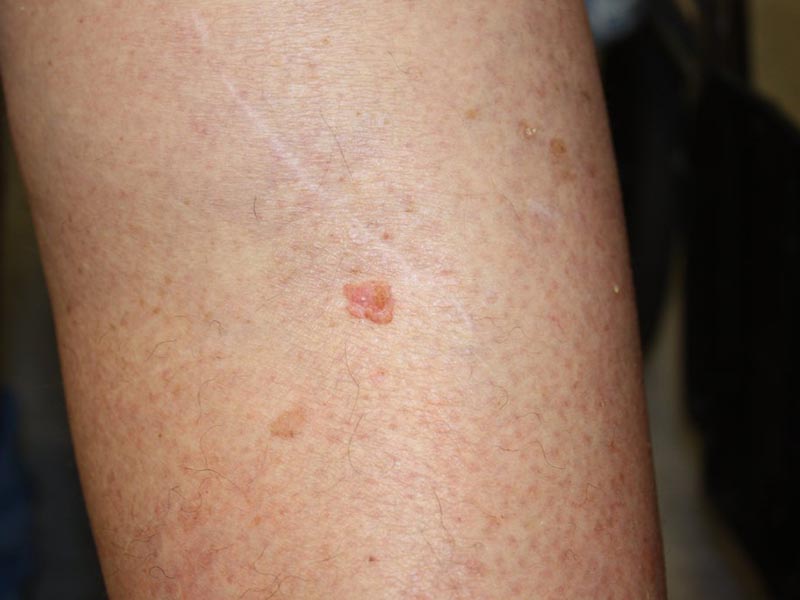
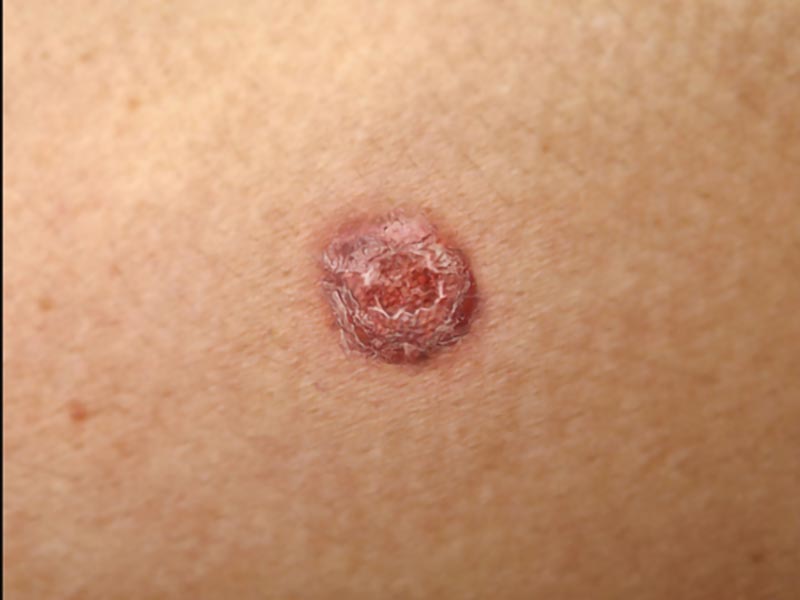
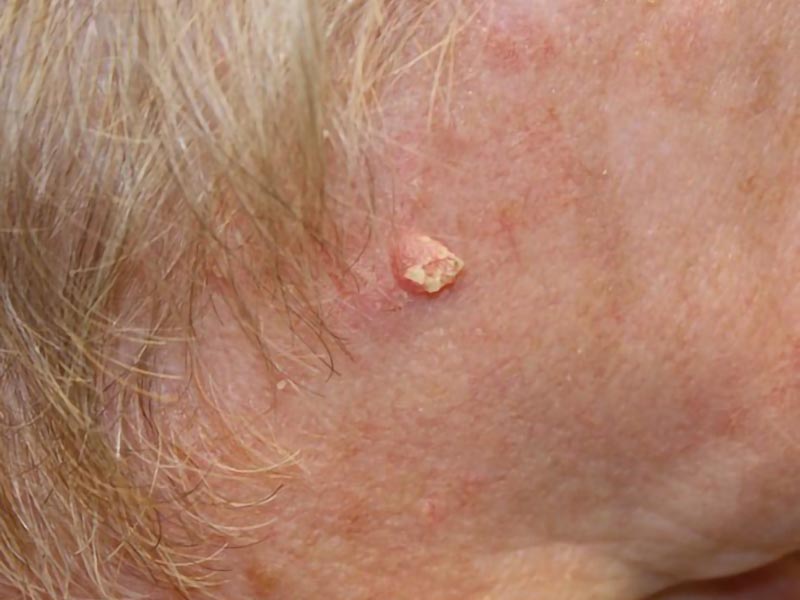
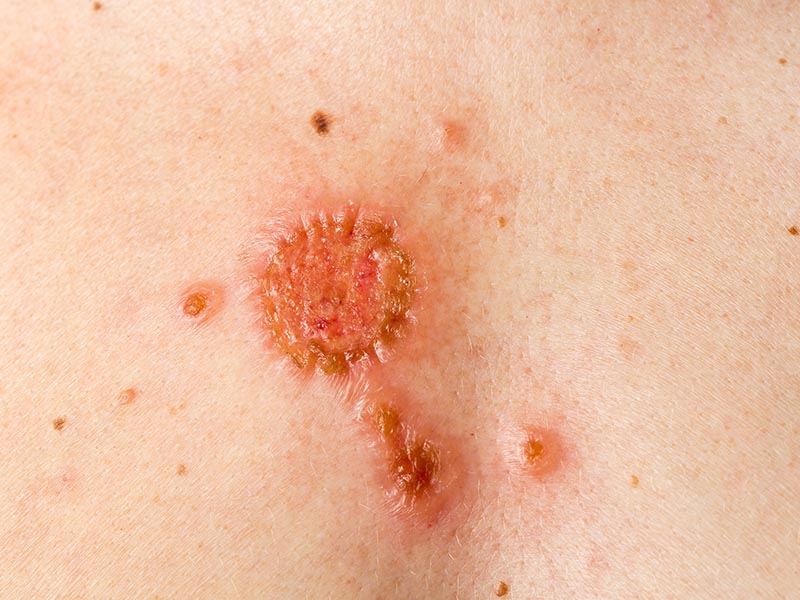
HOW IS SQUAMOUS CELL CARCINOMA TREATED?
Squamous carcinomas can be treated with surgical excision or localised radiotherapy.
Our consultants at the Harley Street Dermatology Clinic offer diagnosis and treatment to patients with squamous cell carcinoma.
Remember that the earlier your squamous cell carcinoma is diagnosed and treated, the less the cosmetic disfigurement and the less chance of recurrence or spread.
For more information on squamous cell carcinoma, please see the British Association of Dermatologists website SCC advice leaflet.
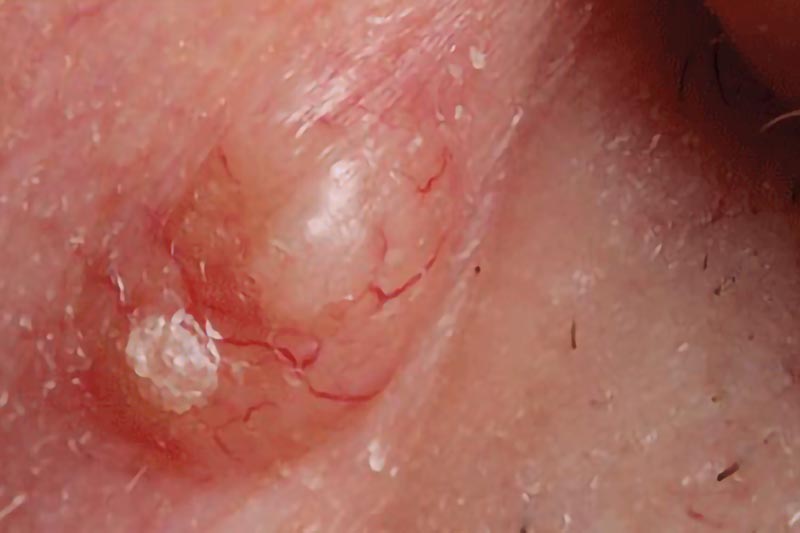
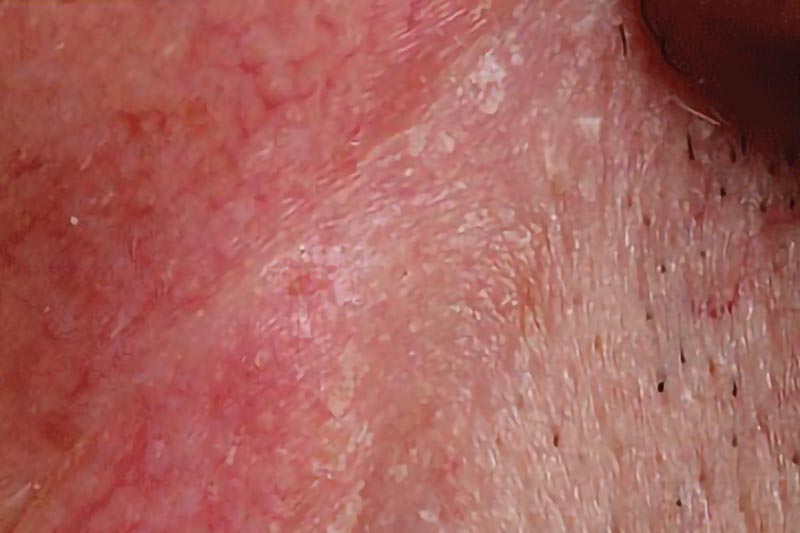
FREQUENTLY ASKED QUESTIONS
Who is most at risk of getting skin cancer?
Men are more likely than women to develop skin cancer and it is more common in the elderly.
What factor sun cream should I use?
It is recommended to use a high factor of sunscreen no matter your skin type. SPF30 with a 4-star UVA rating during the summer is recommended for those with paler skin to stop burning but also to help prevent wrinkles and sunspots in those who don’t burn as easily.
How might squamous cell carcinoma affect me?
The rate of growth and chance of spread of squamous cell carcinoma depends on the differentiation:
- Well differentiated SCC tend to grow slowly with a very low chance of spreading
- Moderately differentiated SCC have a slightly higher rate of growth and chance of spreading than well differentiated tumours
- Poorly differentiated SCC often grow rapidly and are highly likely to spread if left untreated
How can I prevent getting skin cancer?
Protecting your skin is, of course, always the best course of action. The easiest ways you can do this include:
· Wearing a waterproof, high level of SPF protection when in the sun
· Use a daily moisturiser with SPF protection
· Avoid the sun when it is at its strongest during the day
· Wear a hat when in the sun
· Sit in the shade
Is skin cancer hereditary?
Skin cancer is not hereditary in the sense that it is passed down through a gene. However, skin type does run in families so those more likely to develop skin cancer are often in the same family.
WHY CHOOSE THE HARLEY STREET DERMATOLGY CLINIC?
Having the right dermatologist is important especially when you have a chronic skin condition that will require ongoing treatment. We want you to feel confident that we’re providing you with the best possible care. We also want you to feel as comfortable as possible with your dermatologist.
The Harley Street Dermatology Clinic specialises in conditions affecting the skin, hair and nails. Our goal is to provide all the care that you need when you’re experiencing these kinds of problems. We want to make it easy for you to access the best quality treatment and support in London.
The clinic is conveniently located in Central London, so it’s easy to visit us if you need to see a dermatologist. You will find yourself in a very comfortable and welcoming environment. We have created a relaxing space where you will receive the highest quality of care. We are regulated by the Care Quality Commission, are part of the British Association of Dermatologists and are top rated by patients of Doctify so you can be sure of safe and effective treatment with us.
CONTACT US
Finding Us
The Harley Street Dermatology Clinic
35 Devonshire Place
London
W1G 6JP
The clinic can be accessed by public transport, on foot or by car. There is paid on street parking around the Harley Street district. The nearest tube stations are Regent’s Park and Baker Street, and Marylebone train station is a 15 minute walk away.
Contact Details
Opening Hours
While appointments can be made available outside usual hours in special circumstances, our core hours are:
Monday: 8am - 6pm
Tuesday: 8am - 6pm
Wednesday: 8am - 6pm
Thursday: 8am - 6pm
Friday: 8am - 6pm
Saturday : 10am - 2pm
Sunday: Closed
REQUEST A CALL BACK
Please fill in this form and one of our team will give you a call back to arrange a consultation with one of our expert dermatologists.
